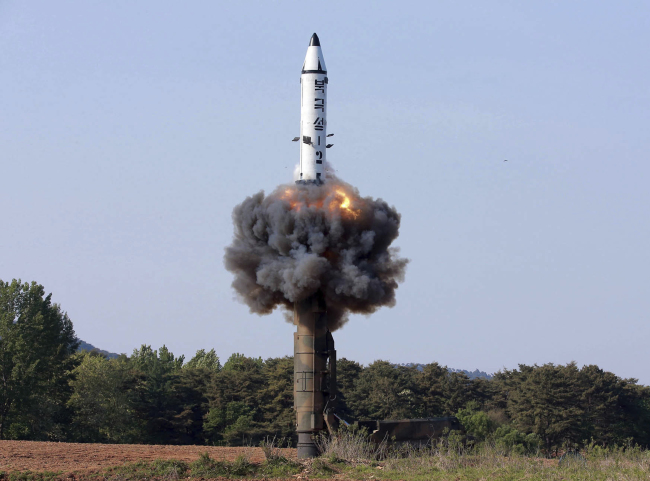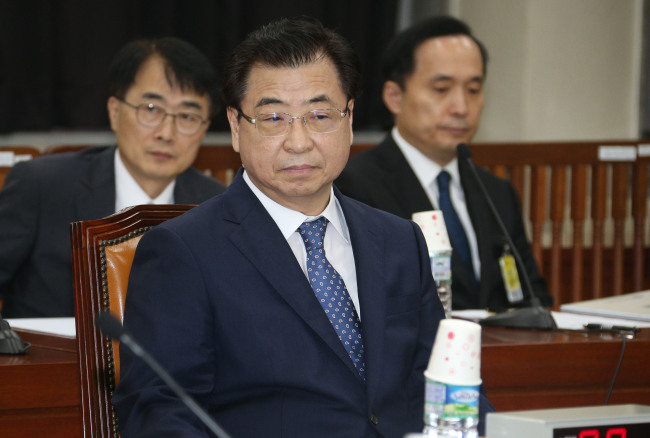North Korea yet to master re-entry technology for ICBM: NIS
By Shin Hyon-heePublished : July 11, 2017 - 18:53
North Korea has yet to master re-entry technology for its recently tested intercontinental ballistic missile, though it has been making “faster-than-expected” progress, Seoul’s spy agency said Tuesday.
At a closed-door parliamentary briefing, the National Intelligence Service assessed the launch on July 4 as an “initial-level” flight test using a fixed launcher, instead of a road-mobile system set for actual deployment, lawmakers said.
Although the North is progressing faster than expected, it is likely to still be working on the re-entry technology, the agency said. The assessment runs contrary to Pyongyang’s assertion that it had verified the reliability of late-stage guidance and heat resistance for a nuclear warhead under the maximum hostile re-entry conditions.
“It has not been confirmed whether it succeeded in re-entry, and given that it does not have a related testing facility, it appears to have not yet secured the technology,” Rep. Yi Wan-young of the Liberty Korea Party told reporters after the session.
“Despite North Korea’s claim, the late-stage guidance technology, which is used to get the missile to precisely hit the target, is not yet fully developed because you would have to have the re-entry technology first.”
At a closed-door parliamentary briefing, the National Intelligence Service assessed the launch on July 4 as an “initial-level” flight test using a fixed launcher, instead of a road-mobile system set for actual deployment, lawmakers said.
Although the North is progressing faster than expected, it is likely to still be working on the re-entry technology, the agency said. The assessment runs contrary to Pyongyang’s assertion that it had verified the reliability of late-stage guidance and heat resistance for a nuclear warhead under the maximum hostile re-entry conditions.
“It has not been confirmed whether it succeeded in re-entry, and given that it does not have a related testing facility, it appears to have not yet secured the technology,” Rep. Yi Wan-young of the Liberty Korea Party told reporters after the session.
“Despite North Korea’s claim, the late-stage guidance technology, which is used to get the missile to precisely hit the target, is not yet fully developed because you would have to have the re-entry technology first.”

Rep. Kim Byung-kee of the ruling Democratic Party, who also took part in the meeting, said that though a detailed analysis is required, the latest provocation indicated that the North has been making speedier progress in its ICBM development.
Aside from the technological purposes, the spy agency called the experiment an attempt by the North to express dissatisfaction over a recent South Korea-US summit, spread the view worldwide that sanctions are of no use, and highlight the image of leader Kim Jong-un as a strong leader.
Pyongyang also appears to be “ready” to conduct a fresh nuclear test at its Punggye complex at any time, but no signs of an imminent explosion were spotted at this point, it added.
In a recent shake-up in the North, Kim picked Ho Yong-bok, director general for Africa, Arab and Latin America at the Foreign Ministry, as a new vice foreign minister, and promoted Vice Public Health Minister Jang Jun-sang to minister, the NIS noted.
The official Korea Central News Agency reported last week that a delegation led by Ho visited Angola, which has longstanding ties with North Korea, to discuss a joint construction project, public health and information technology.

At home, the NIS said it will carry out a sweeping reform focusing on eliminating domestic functions and investigating past allegations such as on its suspected interference in a 2012 presidential election, during which President Moon Jae-in was defeated.
To that aim, Director Suh Hoon unveiled its plan to abolish the information officer system under which it dispatches agents to state agencies and media organizations to collect information.
The NIS is also seeking to refurbish the three-pronged organization by shifting the main duties of the second deputy director, who is currently responsible for domestic intelligence and anticommunist investigations, to take charge of North Korea affairs. The first deputy director will now move away from North Korea activities and concentrate on overseas undertakings, while the third deputy director is tasked with counterespionage issues.
The NIS has also launched a 13-strong task force including eight outside experts to facilitate the project.
“The closure of the information officer system is the first reform action since Suh took office, and a groundbreaking, unprecedented one,” Kim Byung-kee said.
“Taking this as a chance to take off afresh, the NIS said it will reinforce its core obligations as well as future strategic planning through the change in the organization and removal of the domestic functions, abandoning politics for national security.”
By Shin Hyon-hee (heeshin@heraldcorp.com)










![[Hello India] Hyundai Motor vows to boost 'clean mobility' in India](http://res.heraldm.com/phpwas/restmb_idxmake.php?idx=644&simg=/content/image/2024/04/25/20240425050672_0.jpg&u=)








